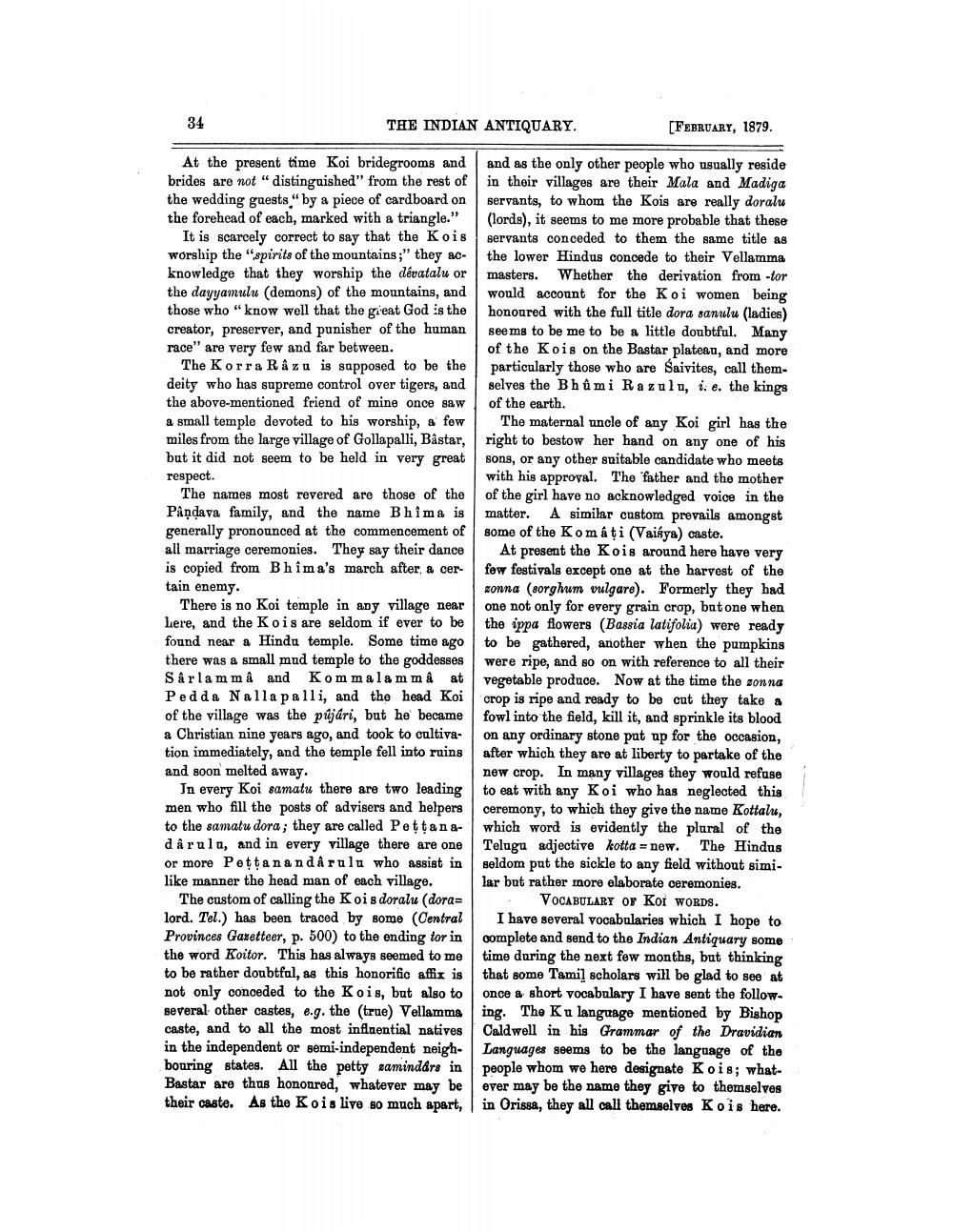________________
34
THE INDIAN ANTIQUARY.
At the present time Koi bridegrooms and brides are not "distinguished" from the rest of the wedding guests" by a piece of cardboard on the forehead of each, marked with a triangle."
It is scarcely correct to say that the Kois worship the "spirits of the mountains;" they acknowledge that they worship the dévatalu or the dayyamulu (demons) of the mountains, and those who "know well that the great God is the creator, preserver, and punisher of the human race" are very few and far between.
The Korra Râzu is supposed to be the deity who has supreme control over tigers, and the above-mentioned friend of mine once saw a small temple devoted to his worship, a few miles from the large village of Gollapalli, Bâstar, but it did not seem to be held in very great respect.
The names most revered are those of the
Pandava family, and the name Bhima is generally pronounced at the commencement of all marriage ceremonies. They say their dance is copied from Bhima's march after a certain enemy.
There is no Koi temple in any village near Lere, and the Kois are seldom if ever to be found near a Hindu temple. Some time ago there was a small mud temple to the goddesses Sårlammâ and Kommalammâ at Pedda Nallapalli, and the head Koi of the village was the pújári, but he became a Christian nine years ago, and took to cultivation immediately, and the temple fell into ruins and soon melted away.
In every Koi samatu there are two leading men who fill the posts of advisers and helpers to the samatu dora; they are called Petṭanadârulu, and in every village there are one or more Peṭṭanandarulu who assist in like manner the head man of each village.
The custom of calling the Kois doralu (dora= lord. Tel.) has been traced by some (Central Provinces Gazetteer, p. 500) to the ending tor in the word Koitor. This has always seemed to me to be rather doubtful, as this honorific affix is not only conceded to the Kois, but also to several other castes, e.g. the (true) Vellamma caste, and to all the most influential natives in the independent or semi-independent neighbouring states. All the petty zamindars in Bastar are thus honoured, whatever may be their caste. As the Kois live so much apart,
[FEBRUARY, 1879.
and as the only other people who usually reside in their villages are their Mala and Madiga servants, to whom the Kois are really doralu (lords), it seems to me more probable that these servants conceded to them the same title as the lower Hindus concede to their Vellamma masters. Whether the derivation from -tor would account for the Koi women being honoured with the full title dora sanulu (ladies) seems to be me to be a little doubtful. Many of the Kois on the Bastar plateau, and more particularly those who are Saivites, call themselves the Bhumi Razulu, i. e. the kings of the earth.
The maternal uncle of any Koi girl has the right to bestow her hand on any one of his sons, or any other suitable candidate who meets with his approval. The father and the mother of the girl have no acknowledged voice in the matter. A similar custom prevails amongst some of the Kom âți (Vaisya) caste.
At present the Kois around here have very few festivals except one at the harvest of the zonna (sorghum vulgare). Formerly they had one not only for every grain crop, but one when the ippa flowers (Bassia latifolia) were ready to be gathered, another when the pumpkins were ripe, and so on with reference to all their vegetable produce. Now at the time the zonna crop is ripe and ready to be cut they take a fowl into the field, kill it, and sprinkle its blood on any ordinary stone put up for the occasion, after which they are at liberty to partake of the new crop. In many villages they would refuse to eat with any Koi who has neglected this ceremony, to which they give the name Kottalu, which word is evidently the plural of the Telugu adjective kotta = new. The Hindus seldom put the sickle to any field without similar but rather more elaborate ceremonies. VOCABULARY OF Koi WORDS.
I have several vocabularies which I hope to complete and send to the Indian Antiquary some time during the next few months, but thinking that some Tamil scholars will be glad to see at once a short vocabulary I have sent the following. The Ku language mentioned by Bishop Caldwell in his Grammar of the Dravidian Languages seems to be the language of the people whom we here designate Kois; whatever may be the name they give to themselves in Orissa, they all call themselves Kois here.




